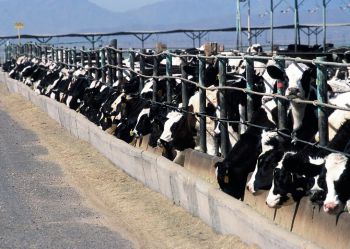Shoppers could be left in the dark about hazardous hormone-treated beef
By: Neil Vowles
Last updated: Friday, 7 September 2018

US beef, which can be treated with hormones and kept in feedlot systems where they never graze, could come to the UK after Brexit.
As the UK prepares to leave the EU, there are signs that some government ministers would be willing to sacrifice food standards to win trade agreements with non-EU states such as the USA.
A new report by food policy experts shows that if the UK’s food standards were weakened in exchange, for example, for lower tariffs on steel, one effect will be that beef from cattle given growth-boosting hormones could enter the UK food supply.
If the standards were lowered, the meat will not be labelled to say how it had been produced. Meanwhile, hormone-produced beef would remain unlawful in the EU, on sound scientific grounds. It might even provoke a boycott of beef in and from the UK.
The report co-authored by professors at the University of Sussex and City, University of London warns that legalising hormone-reared beef would introduce an unnecessary and unacceptable risk to public health.
Hormone-treated beef: Should Britain accept it after Brexit? by Professors Erik Millstone and Tim Lang is published today by the Food Research Collaboration. The authors call on ministers to ensure that food safety standards in the UK will never be weakened, especially not as a bargaining chip in trade talks. The authors also urge UK farmers, supermarkets and butchers to make explicit commitments to consumers never to produce or sell hormone-treated beef.
Erik Millstone, professor of science policy at the University of Sussex, said: “The idea that, once the UK leaves the EU, it will become a rule-maker, not a rule-taker, is illusory. Exporting to other countries requires accepting their standards. The choice is: Which rules to take - the EU’s, the USA’s or the World Trade Organisation’s? If UK products don’t match their standards, they won’t buy them.Trade requires shared rules and minimum standards. Food standards in the EU are far higher than those in the USA, and US standards are far higher than WTO standards. The UK should at least stick to EU; the only changes allowed should be to make food safer, never less safe.”
Hormone use is permitted in cattle rearing by US, Canadian, Mexican and Australian authorities but beef from hormone-treated cattle has been banned in the EU since the mid-1980s.
Tim Lang, professor of food policy at City, University of London, said: “The UK Government should ensure either that food standards remain fully aligned with EU standards, or that we adopt higher standards. There is a triple risk here: to health, to British beef farmers’ livelihoods, and to the UK’s ability to determine its own food safety standards. Hormone use is a test case for whether the UK seeks a more sustainable food supply. Hormone use would be a stupid step towards intensive beef feeding lots.”
The report warns that Public Health England, the Food Standards Agency and Environment Agency, whose role is to protect standards, will require a significant increase in funding to cope, something which no minister has committed to so far. A weakened state infrastructure is about to negotiate with much more powerful trading forces.
The authors make the following recommendations:
• The UK Government should ensure either that food standards remain fully aligned with EU standards, or that higher standards are adopted.
• Food standards should not be sacrificed to facilitate trade in undesirable and/or unsafe products.
• The Government should explicitly acknowledge that any weakening of UK food standards, such as permitting the sale of hormone-reared beef, will result in barriers to UK food companies wishing to export their products to the EU’s Single Market.
• The UK consumer movement should strongly resist moves to weaken current levels of consumer protection as part of future trade deals.
• UK food and farming industries should publicly commit themselves to producing and selling only beef from cattle never treated with synthetic hormones.
